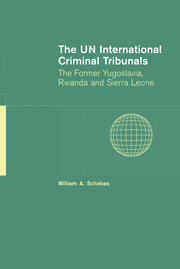Book contents
- Frontmatter
- Contents
- Preface
- Table of cases
- Table of legislative provisions
- List of abbreviations
- PART I Establishment of the tribunals
- PART II Jurisdiction
- PART III Substantive and procedural aspects of prosecution
- 9 General principles of law
- 10 Investigation and pre-trial procedure
- 11 Trial and post-trial procedure
- 12 Evidence
- 13 Rights of the accused
- 14 Punishment
- PART IV Organisation of the tribunals
- Bibliography
- Index
11 - Trial and post-trial procedure
Published online by Cambridge University Press: 05 June 2012
- Frontmatter
- Contents
- Preface
- Table of cases
- Table of legislative provisions
- List of abbreviations
- PART I Establishment of the tribunals
- PART II Jurisdiction
- PART III Substantive and procedural aspects of prosecution
- 9 General principles of law
- 10 Investigation and pre-trial procedure
- 11 Trial and post-trial procedure
- 12 Evidence
- 13 Rights of the accused
- 14 Punishment
- PART IV Organisation of the tribunals
- Bibliography
- Index
Summary
Conduct of trials and post-trial proceedings is described in only the most general of terms in the statutes of the three international tribunals. They acknowledge the right of the accused to appeal a conviction, something enshrined in article 14(5) of the International Covenant on Civil and Political Rights. Trial Chambers are directed to ensure that trials are ‘fair and expeditious and that proceedings are conducted in accordance with the rules of procedure and evidence, with full respect for the rights of the accused and due regard for the protection of victims and witnesses’. But in terms of the actual procedure to be followed, the statutes are extremely laconic. By way of explanation, the report of the Secretary-General that accompanied the draft ICTY Statute said only: ‘The hearings should be held in public unless the Trial Chamber decides otherwise in accordance with its rules of procedure and evidence. After hearing the submissions of the parties and examining the witnesses and evidence presented to it, the Trial Chamber would close the hearing and retire for private deliberations.’
There are quite different approaches to trial procedure in national justice systems. Very approximately, they are divided into two broad systems, described as ‘adversarial’ and ‘inquisitorial’. The initial Rules of Procedure and Evidence, that set out in detail the trial procedure, were based on a draft submitted by the American Bar Association that broadly reflected the adversarial approach.
- Type
- Chapter
- Information
- The UN International Criminal TribunalsThe Former Yugoslavia, Rwanda and Sierra Leone, pp. 410 - 451Publisher: Cambridge University PressPrint publication year: 2006



